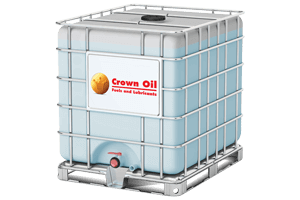AdBlue® for Diesel Engines Delivered Across the UK
AdBlue® (AUS 32, ISO 22241 NOx reduction agent) is a diesel exhaust fluid (DEF) that has been developed for the use in vehicles using Selective Catalytic Reduction systems to help eliminate the harmful emissions released on our roads. The use of the diesel exhaust fluid (DEF) in modern diesel vehicles is a legal requirement to help the UK Government achieve its net-zero target by 2050.
As an official VDA-licenced AdBlue® supplier, our product meets ISO 22241 standards and is available in any quantity from 10 litres up to 5,000 litres and more. Call 0330 123 1444 for a competitive quote.
Where can I buy AdBlue®?
Crown Oil supplies AdBlue® diesel engine fluid (DEF) for all commercial applications across the UK. As such, we can deliver bulk quantities to suit your fleet’s requirements, as well as a wide range of tanks for the safe handling and storage.
How much AdBlue® can be delivered?
Whatever quantity of AdBlue® you require, our vast network of depots and fleet of HVO-fuelled tankers means we can meet your exact needs with a range of delivery quantities available from small containers to bulk supply.
AdBlue® tanks
We also provide a range of AdBlue® storage tanks, which are perfect for keeping your diesel engine fluid clean and safe.
- 950 litre bunded polycube
- 2,000 litre bunded polycube
- 3,500 litre plastic bunded tank
- 6,000 litre plastic bunded tank
- 10,000 plastic bunded tank
So if you’re looking for a bulk AdBlue® supplier or the best solution to store your diesel exhaust fluid, call us today on 0330 123 1444 to see how we can help.

Benefits of buying AdBlue® in bulk
- More convenient for organisations that operate large fleets or simply prefer fewer deliveries/invoices every year
- Remote sites are more at risk from supply shortages – a large onsite AdBlue® tank provides peace of mind that you’ve got enough to see you through until your next delivery
- More cost-effective – not only due to price per litre but also through fewer deliveries, fewer packaging requirements and the time associated with tracking, ordering and receiving smaller drums
- Telemetry systems can be installed in bulk tanks to enable remote monitoring of AdBlue® levels, ensuring you never run out unexpectedly

Crown Oil’s AdBlue® meets ISO 22241 specifications
All AdBlue® that we supply meets ISO 22241 specifications, the standard VDA quality approval.
All the fuels, oils, lubricants and additives that we deliver across the UK meet the required fuel specifications, so you can trust that with Crown Oil, you’re choosing a supplier that’s committed to compliance, quality and safety.

Why quality matters
Quality is essential when it comes to choosing AdBlue® for many reasons, including:
- Low-quality AdBlue® often contains impurities or additives that can damage your engine’s SCR system, resulting in expensive repairs and downtime
- Using licensed AdBlue® from a trusted supplier ensures compliance with industry standards and regulations, protecting your organisation from potential penalties or fines
Request an AdBlue® price
As is the case with most bulk deliveries, the price of AdBlue® will depend on several factors, including the amount you’re ordering and the location we’re delivering to. Regardless, our AdBlue® quotes are among the most competitive on the market, and we’ll always aim to get you the best price for your AdBlue® diesel engine fluid.
If you have any more questions about AdBlue® or need any help, speak to one of our fuel experts by calling 0330 123 1444 today. You can also request a quote and place an order, so get in touch with us today.
AdBlue® FAQs
What does AdBlue® do? Why do modern diesel-engine vehicles require AdBlue®?
Mixing AdBlue® with diesel-engine exhaust fumes significantly reduces the release of mono-nitrogen oxide from engines.
Reducing NOx emissions is essential as it brings diesel-engine vehicles in line with Euro 6 emissions regulations, which called for a 67% drop in nitrogen oxides (NOx) released in the exhaust emissions of diesel cars.
There are two ways of achieving this reduction: through a Selective Catalytic Reduction (SCR) system and through exhaust gas recirculation. If your vehicle uses the SCR system, then you’ll need AdBlue®.
What’s more, when your SCR-equipped vehicle’s AdBlue® levels are running low, a warning alert will appear on the dashboard. If it runs out completely, the car will lose power and reduce its emissions in line with legal standards. Its performance will be returned when its AdBlue® tank has been replenished.
The main benefit of bringing your fleet in line with Euro 6 standards is that it decreases the overall negative environmental impact of your business operations. It furthermore helps your company to gain more ‘green’ awards and accreditation for meeting emissions regulations. AdBlue® is completely non-flammable, safe to handle and easy to store.
What is AdBlue®?
AdBlue® is the common name used for AUS 32 diesel exhaust fluid (DEF), the diesel fuel exhaust fluid that has been introduced to help eliminate the harmful exhaust emissions released by heavy vehicles used daily on our roads.
Using AdBlue® is an effective means to reduce NOx emissions from diesel engines as it simply requires the addition of the fluid to your vehicle’s AdBlue® tank.
As of October 2006, the use of the DEF in modern diesel vehicles fitted with SCR technology, including both passenger cars and HGVs above 7.5 tonnes (industrial vehicles, buses and trucks) has become a legal requirement to help achieve the UK Government’s net-zero carbon-reduction target by 2050.
As an official AdBlue® supplier, Crown Oil can supply it at a competitive price in any quantity from 10 litres up to 5,000 litres. To purchase AdBlue® from a supplier you can trust, choose Crown Oil.
The AdBlue® trademark is currently held by the German Association of the Automobile Industry (VDA (Verband der Automobilindustrie)). Clicking the link will take you to their page with additional notes about this diesel fuel exhaust fluid.
How does AdBlue® work?
Through a process called Selective Catalytic Reduction (SCR), AdBlue® reduces the harmful emissions which are released by diesel engines as the fuel is burned. AUS 32 (Aqueous Urea Solution 32.5%) is the official name for AdBlue®. It consists of 32.5% high-purity urea and 67.5% deionised water, giving it its scientific name AUS32.
As diesel burns within your vehicle’s engine, it is forced through the exhaust system and expelled out into the air that we breathe. Before the emissions are released, the AdBlue® formula is sprayed onto the harmful gases and the SCR Catalyst breaks down the bad stuff (Nitrous Oxides).
Once that’s done, all that’s left is nitrogen, water and CO2 to be expelled from the exhaust system. Check out the diagram below, which shows AdBlue®’s Nitrous Oxide reduction in action.
Is AdBlue® a fuel additive?
No, AdBlue® is not a fuel additive. It is a diesel exhaust fluid (DEF) that is filled into a separate tank on diesel vehicles to reduce harmful nitrogen oxide (NOx) emissions.
AdBlue is injected into the exhaust stream after combustion, not into the fuel itself.
I’ve put AdBlue® in my diesel tank – now what?
AdBlue® isn’t directly added to your diesel fuel tank – it’s a NOx reduction agent that is sprayed into the exhaust fumes by your car exhaust system, so it’s unwise to start your engine if you’ve poured AdBlue® into your diesel tank, as you’ll be letting water into your engine. Call roadside assistance or the appropriate emergency service if this happens to avoid engine breakages.
How long does AdBlue® last?
The rate of consumption for AdBlue® is a ratio of approximately 1:20 of the rate of diesel fuel usage on standard Euro IV, Euro V and Euro VI trucks, so its relatively low AdBlue® solution is sprayed into the exhaust stream of modern diesel engines as a post-combustion process. For passenger cars, 1.5 litres of AdBlue will be used every 620 miles.
Our guide to AdBlue has a more detailed estimate of AdBlue® fluid consumption.
How do I store AdBlue®?
While storing AdBlue® is straightforward, it must be kept between -11oC and 30oC to maximise its 12-month lifespan. As well as supplying a wide range of fuel storage tanks, we can also provide AdBlue® storage tanks to safely store it, in addition to both hand and electric pump options depending on your requirements.
Since AdBlue is corrosive, these pumps make the dispensing process easier and safer, but you should always ensure you’re using it with care and be sure to wash your hands thoroughly after contact.
What emission reductions are there from using AdBlue®?
Water vapour, nitrogen and carbon dioxide are released from the vehicle’s exhaust when DEF is used. NOx (nitrous oxides) are usually released from a vehicle’s exhaust, which is damaging to the environment. Through the process of SCR, the AdBlue® solution breaks down the NOx emissions and outputs much cleaner and safer levels of emissions.
To reduce the pollutant levels across Europe, using SCR technology has become a legal requirement when manufacturing heavy goods vehicles (HGVs).
Is all AdBlue® the same?
AdBlue® is, in fact, a trademark of VDA (Verband der Automobilindustrie), but so long as the diesel exhaust fluid you buy is certified to meet the AUS 32 criteria and meets ISO 22241, then there is no difference between which brand you use.
What happens if you run out of AdBlue®?
Typically, before running out, a warning light will go off on your dashboard to indicate you are low on diesel engine fluid. However, once this runs out, vehicles will not start if the AdBlue® tank is empty, as the emissions that would be released from the engine would be too high.
What is AdBlue® made of?
AdBlue® is technically known as AUS 32, derived from Aqueous Urea Solution 32.5%. AdBlue® contains 32.5% high-purity urea and 67.5% deionised water.
Is AdBlue® pig’s urine?
No. The reason for this misconception is that AUS 32 diesel engine fluid is made from a solution of urea and deionised water, and urea is most commonly known as the chemical found in urine. Due to the industrial amounts of urea that need to be produced, the urea used in AdBlue® is synthetically made.
To get the most out of your AdBlue® supply, read our tips for buying quality AdBlue® diesel engine fluid.
If you have any more questions about AdBlue® or need any help, speak to one of our fuel experts by calling 0330 123 1444 today. You can also request a quote and place an order, so get in touch with us today.





